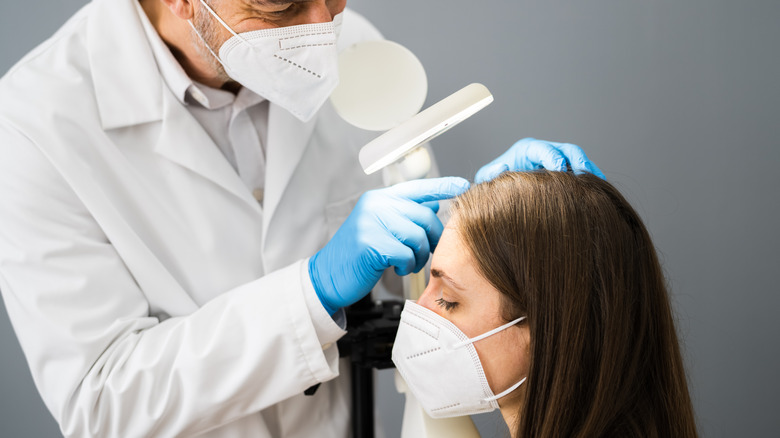Red Flags That You Need To Switch Dermatologists
Keeping your skin, hair, and nails healthy is incredibly important to your wellbeing, so it's no wonder millions of people flock to a dermatologist for specialized treatment every year. There's several reasons you might need to see a dermatologist, whether it's for acne, eczema, hair loss, skin damage, scars, cosmetic purposes, or skin cancer (via Everyday Health). Because there are so few experts in this field, it can take a long time to find a great dermatologist, and it can seem like they're few and far between. However, securing your placement as a patient at your dermatological practice shouldn't stop you from reconsidering them as your specialist if you begin to notice problems.
Your dermatologist shouldn't be any different from your primary care physician, dentist, or surgeon, in the sense that they should be a trusted provider of care who listens to your concerns, treats you well, and is easily accessible. But like any medical professional, they're human, so they're not going to be perfect. And, while small human errors are completely understandable, certain ones should be a cause for concern. So, if you notice any of these red flags next time you go in for an appointment, it might be time for you to find a new dermatologist.
They don't listen to your concerns
Do you find yourself repeating your worries to your dermatologist several times, or that you can't seem to even get a word in? You're not alone. A study revealed the average time a doctor will listen to their patient before they interrupt, and it's shocking. Imagine you've just arrived at your appointment and your dermatologist asks if you have any new concerns, and you begin explaining the problem you're having, only to be interrupted 11 seconds later. You read that right: The average time a doctor will listen before interrupting is only 11 seconds. That doesn't give you much time to express your worries or ask any questions.
It's no surprise they're in such a rush though, as according to Zippia, healthcare providers are under a lot of pressure to meet quotas and see as many patients as possible every day. For a dermatologist, they see up to 50 patients on average in a single eight- to ten-hour shift. This might explain why you feel unheard or like you're getting the bum's rush after a short appointment, but it's no excuse.
Patients aren't perfect either (and may also make mistakes at appointments), but the difference is that you're paying your dermatologist to treat you. It's their duty to listen to your needs in order to provide efficient treatment — and if you don't feel heard or you feel like your dermatologist brushes off your concerns as "nothing," you may need to go to another practice.
You don't trust them
If you don't trust your dermatologist, you shouldn't be seeing them anymore. The distrust you feel for your specialist could be for any number of reasons, but the bottom line is that you need to have confidence in your doctor's abilities in order to see any improvement. Feeling comfortable at your dermatology appointments and taking on the advice your specialist gives will enable you to be more honest with them, which in turn allows your dermatologist to treat your condition more successfully. Additionally, you'll be more likely to follow their guidance, treatment plans, and general advice for your condition if you trust them and believe that they have your best interests in mind as their patient.
Something many cite as a reason for a distrust of their healthcare providers is a lack of representation in the healthcare system. Representation is an ongoing issue, but especially so within dermatology, as only 3% of dermatologists are black (via HealthCentral). This lack of representation, along with the biases, discrimination, and struggles to receive efficient care that patients face regularly, are just some of the reasons why there's a certain level of distrust for healthcare providers (via Medium). Some people have a general dislike for doctors, but your personal experience with your dermatologist, in particular, could also be affecting your ability to trust them fully — which is all the more reason they might not be the right doctor for you.
They're too pushy
When it comes to establishing trust in a patient-doctor relationship, it's fundamental to have faith that your best interest is their number one goal. Why else would you go to a doctor if you didn't think they wanted to help you? But if they're pushing prescription after prescription despite the potential side effects — or more importantly, your wishes to remain off of them — you probably have a bad dermatologist. What's equally concerning is if they're pressuring you to buy their brand-name, expensive skin care products, when you know you could be buying them for half the price online.
According to The Healthy, some dermatologists are recommending products based on the partnerships their practice has with certain brands or sales quotas they need to meet, which can feel dishonest. There are others who will recommend skin care products based solely on their active ingredients, but if they're giving you a hard sell, they might not have your best interest in mind. It's no secret that doctors have been paid to recommend certain drugs over others (via USA Today), with several big drug companies paying their way into doctors' offices and patients' homes. One of these scandals involved dermatologists and a psoriasis treatment that disregarded the patients' safety.
We're not saying that if your dermatologist is being pushy, they're definitely being paid off by big pharma companies — but it's an uncomfortable scenario to be pushed into, and a good dermatologist would never bully their clients this way.
You can't get appointments
So, you like your dermatologist, your first appointment went well, and you feel like this could be the start of your skin's recovery. You go to book a follow-up appointment, and the receptionist informs you the soonest you can be seen is four months away. Dermatologist practices are notoriously busy, and booking appointments can be tricky. Studies show that for every 100,000 people in need of a dermatology appointment, there are just over three dermatologists. The main culprit for this is the fact that there's a cap on how many doctors are allowed to train in dermatology annually, so while the number of patients increases, the number of dermatologists stays the same.
The average wait time for a dermatology appointment was cited as 35 days (per SkinCancer.net), but there are some circumstances where patients have reported waiting months to see their doctor. If you see your dermatologist periodically, this might not constitute a red flag in your eyes. However, for those with a skin condition that needs frequent follow-ups, this is unacceptable. What's the point in sticking with a dermatologist who only has time to see you every few months when you need to be seen every few weeks, especially if the condition is serious? (And don't even get us started on when dermatologists cancel your appointment after such a long wait.)
Your skin isn't improving
There's a number of conditions you can have treated by a dermatologist, but not every condition is curable. For example, psoriasis is a skin condition that can cause itchy, scaly rashes; while there are many treatment options, there is no cure for it, as your dermatologist should inform you (via Healthline). But, for a condition like acne, the right combination of treatments can clear your skin and keep you from having to walk into the dermatologist's office again.
When you've gone the full course of your treatment plan and you're still not seeing results, it can be frustrating. Not every treatment works right away; it can take a lot of trial and error, and even your dermatologist won't always get it right the first time. So when should you be concerned?
If your doctor is refusing to change your treatment or you've tried several courses of action, it might be time for a second opinion. When it comes to acne, which is the eighth most common skin condition in the world, many specialists will treat the skin without getting down to the actual cause. Your dermatologist should take the time to address the types of food you're eating, potential hormone imbalances, or your blood sugar (via Dave Asprey). If they're solely focusing on your skin care routine, there's a chance that your acne won't clear up under their guidance — and that they're not the right doctor for you.
They're not very thorough
Being thorough is the key to great dermatology. If you walk into your first appointment and your dermatologist barely looks at the affected area, or they haven't taken the time to ask about your familial medical history and current skin care routine, they're not paying close enough attention. Mistakes in medicine, while not uncommon, can be life-altering for the patient, which is why this is a major red flag that shouldn't be ignored.
A study on dermatological errors reported, "The most common and easily avoidable sources of medical errors include failure to take a biopsy despite suspicious clinical findings." This is especially worrying for patients coming in with concerns about skin cancer. Specialists in any field are prone to making mistakes, especially given their hectic schedules and overworking, but there are certain approaches that should be taken to avoid mistakes like this. When your dermatologist isn't listening, isn't looking, or isn't testing your conditions, it can come across as if they don't care, and that breaks trust.
Reporting incorrect diagnoses and failing to test for certain conditions happens in dermatology, but it isn't a risk you should take — especially if their advice begins to conflict with your primary care physician's. You know your body better than anyone else, so if you feel like there's something wrong and your current specialist isn't being thorough enough, it's time to switch dermatologists.
They're poor at communicating
This differs from just a lack of listening; indeed, there's a number of problems that can arise from a dermatologist who lacks proper communication skills. If they don't effectively communicate with you, their patient, how can you know what to expect during your course of treatment, or what the future holds for your skin's health? Without efficient communication, you have zero assurance that you should continue seeing them, and you may be put off from asking necessary questions.
According to HIPAA Journal, poor communication in healthcare is a serious problem that can create confusion around medications and treatment plans. This can result in a reduced quality of care, poorer patient outcomes, and worsened conditions, which is the exact opposite result you were looking for when you made the initial appointment to see your dermatologist in the first place.
One study (via Science Daily) found that negative communication between doctors and patients could actually make symptoms worse. The research led experts to conclude that when doctors fail to show understanding, patients can feel distressed and angry, which can actually make the symptoms of their conditions flare up. The mind plays such a critical role in our physical health, which is part of the reason clear communication can be so valuable in dermatology. If your specialist lacks this fundamental skill, it's a red flag that shouldn't be ignored. You'll have better luck seeking out a dermatologist who has the ability to communicate well.
You notice patient reviews dipping
You probably did your research before picking the dermatologist you're with now (as you should), but things can change very quickly and for unknown reasons. If you're noticing new problems when you visit your dermatologist's practice, or if it's been quite a while since you became a patient of theirs, have another look at their patient reviews.
Quality of care can change for a number of reasons. For one, understaffed medical practices often lead to unhappy patients, according to an article by Dermatology Times. The piece discusses a malpractice lawsuit, where a patient of a dermatologist sued him over a scar his practice caused during a procedure. She complained of poor communication from the dermatologist's staff and long wait times between appointments. Little did the patient know, the dermatologist had recently sold his practice to a private equity firm and halved his staff, which made it nearly impossible to provide the high-quality service they once did.
NBC News reported on a chain of dermatology practices owned by a private equity firm that pushed specialists to rake in the cash, leading to overbooking appointments, poor quality control, and worsened patient care. It might not always be obvious what's going on behind the scenes, but a steady decline in reviews shows you're not the only unhappy patient of your dermatologist. If you decide to switch dermatologists, thoroughly checking the reviews of your next one should be at the top of your list.
You feel unhappy after your appointments
Some people find going to any type of doctor to be downright terrifying, and who can blame them? Nobody likes to be poked and prodded. But it can be more serious than that, with roughly 3% of the population suffering from iatrophobia (the fear of doctors). This is usually caused by the dread of receiving bad news, which can make anxiety spike (via NBC News). However, if you were feeling positive before your appointment and you're now leaving feeling unhappy, it could be a red flag that you need to change dermatologists.
Getting help for your condition should provide you with some form of relief that you're getting more information on your issue, being treated, and have an idea of when you'll be healed. Whether it's a poor experience in the waiting room, having to deal with a rude dermatologist, or adverse side effects of your treatment plan, your mental wellbeing can suffer.
According to Practical Dermatology, around 30% of dermatological conditions are affected by psychiatric conditions like anxiety and depression. It's argued that dermatologists have a responsibility not only to treat skin, hair, and nail conditions, but also to monitor their patients' mental health. This is especially true, given how many treatments can negatively impact their patients' psyche. You won't get along with every dermatologist, but they shouldn't leave you feeling down after your appointments. So, do yourself a favor and find a specialist who makes you feel listened to, understood, and positive.









